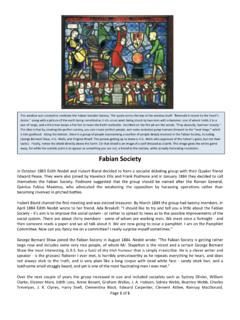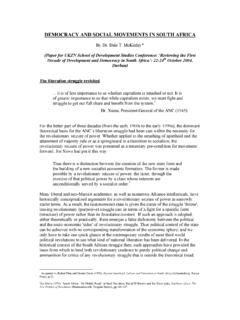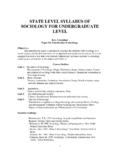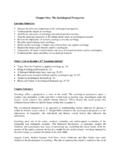Transcription of Marxist Media Theory - CYM
1 Marxist Media TheoryDaniel Chandler Opposition to functionalism Opposition to liberal pluralism Base and superstructure Media as means of production Ideology Media as amplifiers The constitution of the subject Differences within Marxism The Frankfurt School Althusser Gramsci and hegemony Stuart Hall Limitations of Marxist analysis Strengths of Marxist analysis References In Britain and Europe, neo- Marxist approaches were common amongst Media theorists from the late '60s until around the early '80s, and Marxist influences, though less dominant, remain widespread. So it is important to be aware of key Marxist concepts in analysing the mass Media . However, there is no single Marxist school of thought, and the jargon often seems impenetrable to the uninitiated. These notes are intended to provide a guide to some key concepts.
2 Marxist theorists tend to emphasize the role of the mass Media in the reproduction of the status quo, in contrast to liberal pluralists who emphasize the role of the Media in promoting freedom of speech. Opposition to functionalismThe rise of neo-Marxism in social science represented in part a reaction against 'functionalist' models of society . Functionalists seek to explain social institutions in terms of their cohesive functions within an inter-connected, socio-cultural system. Functionalism did not account for social conflict, whereas Marxism offered useful insights into class conflict. Opposition to liberal pluralismAs the time of the European ascendancy of neo-Marxism in Media Theory (primarily in the 1970s and early 1980s), the main non- Marxist tradition was that of liberal pluralism (which had been the dominant perspective in the United States since the 1940s) (see Hall 1982: 56-65).
3 As Gurevitch et al. put it: Pluralists see society as a complex of competing groups and interests, none of them predominant all of the time. Media organizations are seen as bounded organizational systems, enjoying an important degree of autonomy from the state, political parties and institutionalized pressure groups. Control of the Media is said to be in the hands of an autonomous managerial elite who allow a considerable degree of flexibility to Media professionals. A basic symmetry is seen to exist between Media institutions and their audiences, since in McQuail's words the 'relationship is generally entered into voluntarily and on apparently equal terms'.. and audiences are seen as capable of manipulating the Media in an infinite variety of ways according to their prior needs and dispositions, and as having access to what Halloran calls 'the plural values of society ' enabling them to 'conform, accommodate, challenge or reject'.
4 (Gurevitch et al. 1982: 1) In contrast, they continue: Marxists view capitalist society as being one of class domination; the Media are seen as part of an ideological arena in which various class views are fought out, although within the context of the dominance of certain classes; ultimate control is increasingly concentrated in monopoly capital; Media professionals, while enjoying the illusion of autonomy, are socialized into and internalize the norms of the dominant culture; the Media taken as a whole, relay interpretive frameworks consonant with the interests of the dominant classes, and Media audiences, while sometimes negotiating and contesting these frameworks, lack ready access to alternative meaning systems that would enable them to reject the definitions offered by the Media in favour of consistently oppositional definitions.
5 (ibid.) Base and superstructureEconomism (also called 'vulgar Marxism') is a key feature of 'classical Marxism' (orthodox or fundamentalist Marxism). In economism, the economic base of society is seen as determining everything else in the superstructure, including social, political and intellectual consciousness. Theories positing economic relations as the basic cause of social phenomena are also called materialist theories, and Marx's version is also known as 'historical materialism'. Mass Media research in this fundamentalist tradition interprets the 'culture industries' in terms of their economic determination. According to this view, 'the contents of the Media and the meanings carried by their messages primarily determined by the economic base of the organizations in which they are produced' (Curran et al. 1982: 18).
6 Consequently, 'commercial Media organizations must cater to the needs of advertisers and produce audience-maximizing products (hence the heavy doses of sex-and-violence content) while those Media institutions whose revenues are controlled by the dominant political institutions or by the state gravitate towards a middle ground, or towards the heartland of the prevailing consensus' (ibid.). Marxists of the 'political economy' variety (such as Graham Murdock) still see ideology as subordinate to the economic base. The base/superstructure model as applied to the mass Media is associated with a concern with the ownership and control of the Media . Critics regard economism as reductionist, failing to account for diversity. Althusserian Marxists propose 'the relative autonomy of the superstructure with respect to the [and] the reciprocal action of the superstructure on the base' (Althusser, cited in Lapsley & Westlake 1988: 5; my emphasis).
7 According to this view ideological practices such as the mass Media are relatively autonomous from economic determination (see Stevenson 1995: 15-16). The notion of 'relative autonomy' has been subject to criticism ( by Paul Hirst in 1977: see Lapsley & Westlake 1988: 13-14; Curran et al. 1982: 25). Under the influence of Althusser, Stuart Hall and other 'culturalist' Marxists reject the base/superstructure formulation, arguing that there is a dialectic between what Marx termed 'social being' and 'social consciousness' (Curran et al. 1982: 27). Media as means of productionThe mass Media are, in classical Marxist terms, a 'means of production' which in capitalist society are in the ownership of the ruling class. According to the classical Marxist position, the mass Media simply disseminate the ideas and world views of the ruling class, and deny or defuse alternative ideas.
8 This is very much in accord with Marx's argument that: The class which has the means of material production at its disposal has control at the same time over the means of mental production, so that thereby, generally speaking, the ideas of those who lack the means of mental production are subject to it. (Marx & Engels: The German Ideology, cited in Curran et al. 1982: 22). According to this stance, the mass Media functioned to produce 'false consciousness' in the working-classes. This leads to an extreme stance whereby Media products are seen as monolithic expressions of ruling class values, which ignores any diversity of values within the ruling class and within the Media , and the possibility of oppositional readings by Media audiences. IdeologyA central feature of Marxist Theory is the 'materialist' stance that social being determines consciousness.
9 According to this stance, ideological positions are a function of class positions, and the dominant ideology in society is the ideology of its dominant class. This is in contrast to the 'idealist' stance that grants priority to consciousness (as in Hegelian philosophy). Marxists differ with regard to this issue: some interpret the relationship between social being and consciousness as one of direct determination; others stress a dialectical relationship. In fundamentalist Marxism, ideology is 'false consciousness', which results from the emulation of the dominant ideology by those whose interests it does not reflect. From this perspective the mass Media disseminate the dominant ideology: the values of the class which owns and controls the Media . According to adherents of Marxist political economy the mass Media conceal the economic basis of class struggle; 'ideology becomes the route through which struggle is obliterated rather than the site of struggle' (Curran et al.)
10 1982: 26). Althusser rejected the notion of false consciousness, stressing that ideology is the medium through which we experience the world (Curran et al. 1982: 24). Althusserian Marxism stresses the irreducibility and materiality of ideology: , ideology is seen as a determining force in its own right. The ideological operation of the mass Media in the West contributes to the reproduction of the capitalist system. Another Marxist theorist of ideology, Valentin Volosinov, has been influential in British cultural studies. Volosinov argued that a Theory of ideology which grants the purely abstract concept of consciousness an existence prior to the material forms in which it is organized could only be metaphysical. Ideological forms are not the product of consciousness but rather produce it. As Tony Bennett notes: 'Rather than being regarded as the product of forms of consciousness whose contours are determined elsewhere, in the economic sphere, the signifying systems which constitute the sphere of ideology are themselves viewed as the vehicles through which the consciousness of social agents is produced' (Bennett 1982: 51).






